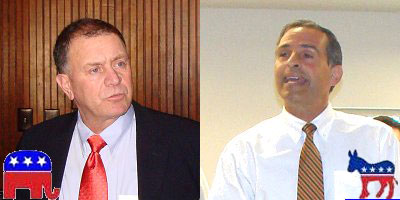- By Dan Veaner
- News
 Print
Print  Candidates to Represent Lansing in Congress
Candidates to Represent Lansing in CongressTake Different Campaign Approaches
Two years ago Richard Hanna challenged Michael Arcuri for the 24th District U.S. Congressional seat. Arcuri, a moderate Democrat who had been Oneida County District Attorney for 13 years, had served one term in the office. Hanna, a businessman and Republican, attacked Arcuri without really saying what he stood for himself. On election night the votes for each candidate went up and down like a teetering scale. With 98 percent of the votes in, Arcuri was ahead of Hanna only by about 1,800 votes out of 209,000. After the final count Arcuri won, but Hanna had 48% of the vote.
This year Hanna is geared up for a repeat performance that he hopes will have a different outcome in the last act. Both candidates say the campaign will be different. Hanna says that considering the time allotted and lack of experience in running a campaign that his 48% was remarkable. He says that by starting the campaign earlier and learning from the last election he thinks he can win it this November. Arcuri says that his team will have to be more effective in getting his message to the voters this time around. He says that with two more years under his belt he has a record that supports his message. And he says that Hanna has no message.
"One thing that we did last time that we continue to do now, is talk about issues," Arcuri said while visiting Dryden last week. "But one of the things that I will talk about is that we have never heard positions from Mister Hanna either two years ago -- or now -- on any issue. He never takes a position on what he thinks we should do to improve the economy.
"We're talking about improving the economy one industry at a time, one job at a time. We're talking about high speed rail. We're talking about the northern border economic development district. We're talking about things like making sure that the water is safe here so that our business can continue. We're talking about stopping the NYRI power lines so the cost of our power is cheap."
While press releases aren't the end-all and be-all of campaign strategy, they do provide a road map of what the campaigns think are important. This year the Star has received 32 press releases from the Hanna camp since he announced the official start of his campaign in January. Arcuri's press staff has sent 18 press releases since he announced in May.
 Richard Hanna at his March visit to Lansing (left); Michael Arcuri at a Dryden press conference last week |
Of Hanna's 32 only four contain substantive news, including the initial campaign announcement, one on how much money he has raised, and other campaign issues such as planning to visit a community in the district. 13 criticized Arcuri without offering specifics on how Hanna would handle the situations. Two or three criticized Arcuri for voting against the health care bill, something Hanna agreed with, but he said Arcuri had flip-flopped. There were seven releases about endorsements from Republican committees around the district, and eight reports on media outlets that are reporting that the race is a toss-up.
Only seven of Arcuri's releases had any direct bearing on the campaign: one announced his candidacy and six others reported on Democratic committees endorsing him. The other 11 press releases dealt with substantive issues including veterans' rights and benefits, local business and trade policy, the impact of the economic recovery, support for local dairy farmers, holding Wall Street accountable for its part in tanking the economy, curbing government waste, and the amendment he got passed in committee last week to take away the exemption for storm water permitting that oil and gas exploration companies currently enjoy.
When Hanna was in Lansing in March he was a little more forthcoming on where he stands on issues. He talked about making thoughtful decisions about the environment and the Marcellus Shale, jobs in New York State, and the way the federal stimulus was mishandled.
"That's one of the problems with the $787 billion dollar (stimulus money)," he said. "It focussed way too little on infrastructure. The stimulus package that is now over $800 billion was primarily a government self-stimulus package. A lot of it went to government redecorating. Not enough if it went to infrastructure. That's where the jobs are. If you want to create employment that's where you put your money. Maybe 14% of that money went there. I thought that was a mistake."
With both candidates concentrating on the more highly populated northern-most parts of the district, voters here in the more rural part of the district don't have much to go on in terms of how Hanna would make positive change. He criticizes Arcuri for being a career politician, saying that he (Hanna) represents a more Jeffersonian vision of a working man who goes to Washington for a time, then returns to the private sector.
Arcuri doesn't pull any punches when talking about what he thinks about that.
"You have to have an idea," he says. "You can't just sit around in much the same way the Republicans are doing in Washington, and just say 'no, no, no.' You have to say, 'No, here is what my idea is.' His campaign has been devoid of any ideas or creativity in terms of what to do in the future."
Several media outlets have reported that the race will be a close one again. Given that you would expect that both campaigns will step up their game. Hanna pointed out that two years ago he was in the closest race against an incumbent in the whole country, despite starting late and being outspent by hundreds of thousands of dollars by an experienced politician with an organization. He says with more party support this year, more experience, and a longer campaign period he can win it.
Arcuri seemed late to engage in the last election, and while it is still very early in the election cycle he doesn't seen particularly engaged now, focusing instead on his work in Congress. He seems to be taking the position that by actually doing things that people will see he is working hard for the district. That approach didn't work particularly well last time, but Arcuri is talking about tweaks to the approach rather than a campaign make-over.
"It's changing the message a little bit in terms of how we deliver it," he says. "Last time all I did was talk about what my ideas for the future were," Arcuri said. "Now we have two more years of having done those things, and having brought money back to the district. Now we have twice as much time to show what we have accomplished. We've accomplished much more and now we can move forward in terms of talking about what we see. Again, it's not just about saying no. It's about saying what our vision for the future is."
In party politics the pendulum of public opinion swings from one party to the other, putting one in power for a time. Then as Americans become disenchanted with what the sitting party is doing the pendulum swings the other way. Do Americans avoid having to know about the issues by simply making the simple choice between red and blue? Republican or Democrat? Incumbent or challenger? If so, Hanna may have the edge as President Obama's approval rating continues to tank. But if local voters want to elect their congressman based on issues it will mean that both candidates will need to step up their campaigns by being very clear about what they will do for the district in the next two year term.
----
v6i27
elections2010



